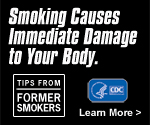Five Keys for Quitting Smoking
Studies have shown that these five steps will help you quit and quit for good. You have the best chances of quitting if you use them together.
- Get Ready
- Get Support
- Learn new skills and behaviors
- Get medication and use it correctly
- Be prepared for relapse or difficult situations
1. Get Ready
- Set a quit date.
- Change your environment.
- Get rid of ALL cigarettes and ashtrays in your home, car, and place of work.
- Don't let people smoke in your home.
- Review your past attempts to quit. Think about what worked and what did not.
- Once you quit, don't smoke—NOT EVEN A PUFF!
2. Get Support and Encouragement
Studies have shown that you have a better chance of being successful if you have help. You can get support in many ways:
- Tell your family, friends, and co-workers that you are going to quit and want their support. Ask them not to smoke around you or leave cigarettes out where you can see them.
- Talk to your health care provider (e.g., doctor, dentist, nurse, pharmacist, psychologist, or smoking cessation coach or counselor).
- Get individual, group, or telephone counseling. Counseling doubles your chances of success.
- The more help you have, the better your chances are of quitting. Free programs are available at local hospitals and health centers. Call your local health department for information about programs in your area.
- Telephone counseling is available at 1-800-QUIT-NOW.
3. Learn New Skills and Behaviors
- Try to distract yourself from urges to smoke. Talk to someone, go for a walk, or get busy with a task.
- When you first try to quit, change your routine. Use a different route to work. Drink tea instead of coffee. Eat breakfast in a different place.
- Do something to reduce your stress. Take a hot bath, exercise, or read a book.
- Plan something enjoyable to do every day.
- Drink a lot of water and other fluids.
4. Get Medication and Use It Correctly
Medications can help you stop smoking and lessen the urge to smoke.
- The U.S. Food and Drug Administration (FDA) has
approved seven medications to help you quit smoking:
- Bupropion SR—Available by prescription.
- Nicotine gum—Available over-the-counter.
- Nicotine inhaler—Available by prescription.
- Nicotine nasal spray—Available by prescription.
- Nicotine patch—Available by prescription and over-the-counter.
- Nicotine lozenge—Available over-the-counter.
- Varenicline tartrate—Available by prescription.
- Ask your health care provider for advice and carefully read the information on the package.
- All of these medications will at least double your chances of quitting and quitting for good.
- Nearly everyone who is trying to quit can benefit from using a medication. However, if you are pregnant or trying to become pregnant, nursing, younger than 18 years of age, smoking fewer than 10 cigarettes per day, or have a medical condition, talk to your doctor or other health care provider before taking medications.
- For information on FDA-approved medications, call 1-800-QUIT-NOW. To find out more about prescriptions, contact your health care provider.
5. Be Prepared for Relapse or Difficult Situations
Most relapses occur within the first 3 months after quitting. Don't be discouraged if you start smoking again. Remember, most people try several times before they finally quit. The following are some difficult situations you may encounter:
- Alcohol: Avoid drinking alcohol. Drinking lowers your chances of success.
- Other smokers: Being around smoking can make you want to smoke.
- Weight gain: Many smokers will gain some weight when they quit, usually less than 10 pounds. Eat a healthy diet and stay active. Don't let weight gain distract you from your main goal—quitting smoking. Some quit-smoking medications may help delay weight gain.
- Bad mood or depression: There are a lot of ways to improve your mood other than smoking. Some smoking cessation medications also lessen depression.
If you are having problems with any of these situations, talk to your doctor or other health care provider.
For more information on quitting, call 1-800-QUIT-NOW or visit www.smokefree.gov
Contact Us:
- CDC/Office on Smoking and Health
4770 Buford Highway
MS K-50
Atlanta, Georgia 30341-3717 - 800-CDC-INFO
(800-232-4636)
TTY: (888) 232-6348
8am–8pm ET
Monday–Friday
Closed Holidays - tobaccoinfo@cdc.gov






